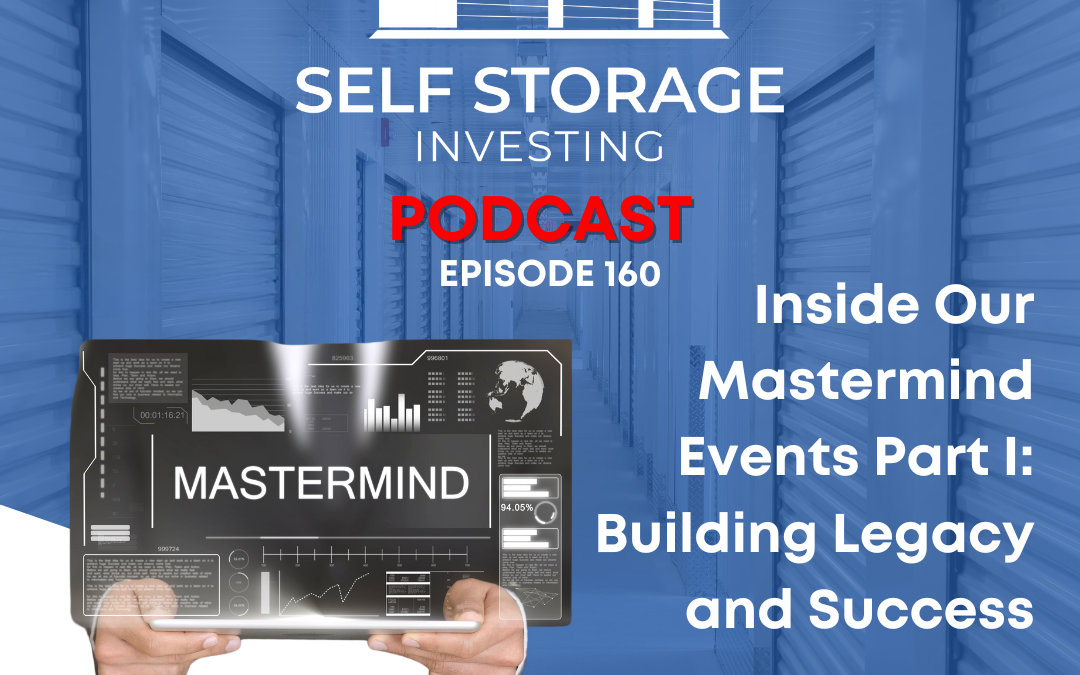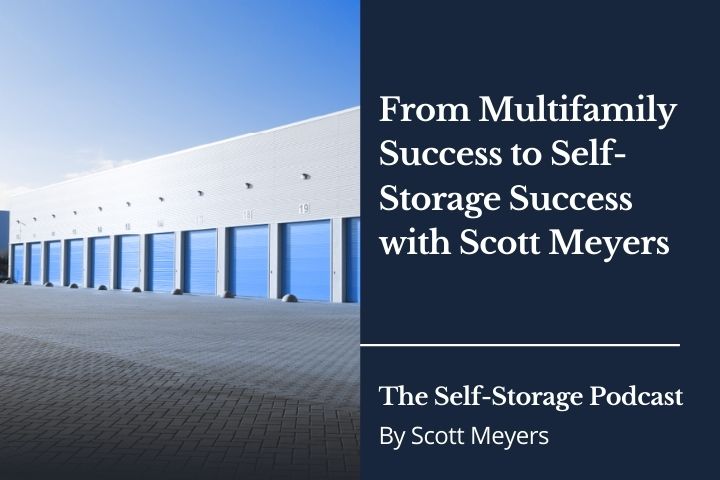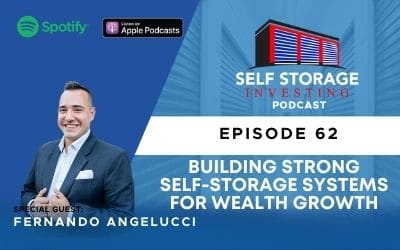The next three episodes are going to be a unique experience. For the first time, we’re opening the doors to our exclusive mastermind events, allowing you to listen in and gain invaluable insights at no cost.
Part I is a special episode featuring industry titan Rick Gibson, who shares his vast experience in self-storage, including his journey through investing and the impactful lessons he’s learned along the way.
Nothing beats being at our mastermind events where you can network and ask your questions… but in this episode you’ll get an inside look at the discussions that shape success in this industry, from investment strategies to life-changing decisions.
WHAT TO LISTEN FOR
2:22 Rick Gibson’s Diverse Portfolio
5:02 The Significance of Relationships in Mastermind Events
14:02 The Concept of “Die with Zero”
27:45 Insights on Self-Storage Unit Mixes and Market Needs
Leave a positive rating for this podcast with one click
CONNECT WITH US
Website | You Tube | Facebook | X | LinkedIn | Instagram
Follow so you never miss a NEW episode! Leave us an honest rating and review on Apple or Spotify.
Episode Transcript
Announcer (00:07):
This is the Self-Storage Podcast where we share the knowledge and skills from the industry’s leading investors, developers, and operators to help you launch and grow your Self storage business. Your host, Scott Meyers, over the past 18 years has acquired, developed, converted and syndicated nearly 5 million square feet of Self storage nationwide with the help of his incredible team at Selfstorageinvesting.com, who has helped thousands of people achieve greatness in Self storage.
Scott Meyers (00:42):
So next up we have Mr. Rick Gibson, who operates out of, well you can say Missouri, but also parts of Florida and other places in between where there’s golf courses and horse racing tracks as well. So I’m thankful for Rick and for many reasons. First of all, he puts us trust in us in many areas, not only in the mastermind, but then also as a partner in investing and also as a passive investor as well. We’ve had a lot of conversations about the business, about life now that he is retired, semi-retired, slowing down now and just looking back on perspective, he and I did a podcast together yesterday and just looking back on that legacy, what that means, impact, significance, legacy as we discussed, and what it means to have a plan put in place or even sometimes the way that things work out, even without having a plan but ending up in a place where that’s pretty cool that he never would’ve expected.
(01:40):
So being in business with those around you that you love is a blessing and having the ability to do the things that his wife has always wanted to do that he could provide for him is a pretty cool place to be. So I’m thankful for Rick for the model and the lessons that he teaches us, and then he’s going to share just a little bit more about that in this session as well. So if you haven’t spent time with Mr. Rick Gibson, you should grab him for a break, grab him at lunch as well. And there’s a lot to learn from folks that are on the other side of a portion of their career and has lived an incredible life like he has and done an incredible job with his family. So with that, a warm up master, I’m welcome to Mr. Rick Gibson.
Rick Gibson (02:22):
Thank you. I feel compelled to start this off by commenting on Rod’s shameless plea for votes, and for those that have been around a while, you’ll remember that Kristen first did her presentation with Rod, brought him in as the eye candy, and they failed miserably in the vote. Kristen dropped. Rod went with Tim and they went, so what’s the difference? And no. Anyway, I may need one of your storage units to live in the first Saturday in May because I got a horse that’s going to be on a Derby trail. So anyway, so with some people. Alright, so my name is Rick Gibson. I know there’s a lot of new people, new guests here on that. I am in business with my sons, Dan and Nick. This is us at a LLC members meeting at the St. Louis City soccer game and one of our storage facilities is paying for these tickets. So it’s nice business to be in. We currently own 10 mobile home parks, about 80 single family rentals, mobile home parks, and the rentals are all in the St. Louis area. Nine storage facilities where we are the majority owner one, we’re a minority owner, so 10 we’re involved in 1900 units, about 200,000 square foot thereabouts on that.
(04:02):
Two years ago, just over two years or under two years ago, we were very, very fortunate. We were in the right place at the right time and a real estate investment trust. A reap bought 11 of our mobile home parks, paid a 4.3 cab for ’em. They approached us in that and because of that, it has certainly changed our lives. It changed our lives for much better. We were able to invest in a lot of projects, a lot of projects, a lot of the members here projects, some of that have been mentioned over the course of the day. And there’s a reason why we’ve chosen to invest in this group. You get to know people, you learn about ’em, you trust ’em. And when we were building our mobile home park group, we had investors, we had small syndicates. I was more worried about my investors’ money than I was about my own.
(05:02):
And I know that’s how the people in this room feel. We partnered with Kim on a build in Ohio and Tim would call, we’re trying to get the dirt work done. Rick, you wouldn’t believe the ring we’re getting in Ohio. I didn’t wonder if he was finishing a project. I trusted Tim. He was there, he was on site. He’s our partner because I’ve gotten to know him in here. So for those of you who are here for the first time, the contacts and the relationships that you make in this mastermind are really, really priceless. Annette, I’m a retired attorney. Last mastermind Tatiana mentioned that at some point she would hope to be a retired attorney and had an experience. As you can imagine, just like passing any milestone in a career when we passed the bar exam, that’s a huge deal. It’s a of relief, it’s a sense of accomplishment.
(05:59):
I wasn’t expecting that feeling when I was able to let the state of Missouri and the state of Illinois know I didn’t need your license anymore and that. So they offered to let me keep it for doing 10 hours of continuing education and $400 a year. And I said, I don’t need your license no more. So that, however, because of being a retired attorney, my give number one is I want you guys to take advantage of my legal experience. I still work in the real estate business a little, honestly, four to six hours a week because of that sale, we were able to buy a house in Florida in a community with golf courses and pickleball and do some stuff. So I got time, I got time and that. I’ve talked to a number of people in this room sometimes about their parents, where their parents are aging and they’re downsizing about how are we going to pay for long-term care, stuff like that.
(07:06):
I’ve been involved in some syndications. I’ve actually done the paperwork on six for ourselves and been involved in others and see this. So just if you want to talk through a deal structure, we’ve had some creative financing deals and stuff like that. So if you want to talk about estate planning or if you want to talk about deal structure questions on syndication, if I don’t know the answer, I probably know where I can send you like this group. But in those areas in my practice, I did trial work for about 25 years, but most people would call estate planning the last 12, 13 in that. And the real estate kind of always did that all the way through in estate planning. Your needs change as you age. I know there’s a number of people in here with young children and that there’s certain things that you need to do there.
(08:03):
Then there’s some of us older folks. I’m glad every time Wendell shows up because I don’t run for the title of the oldest person in the room. No offense sir, but take advantage of that experience. Now, if you call every afternoon, I decide tomorrow am I playing pickleball? Am I going to walk or am I playing golf? Maybe I’m going to do both. And I tell you what guys, what a great feeling. But you don’t know how many of you young people I am jealous of, I’m totally jealous of at 24 years of age, Nick was telling us what he’s accomplished already. Yesterday at 24 years of age, my big week, our big month would’ve been when Notre Dame beat Michigan and Michigan State in football in the same month. Scott. Scott.
(08:57):
But what you guys have accomplished, Fernando, what he’s done with Steven James is climbing Mount Kilimanjaro, Alex and Sammy, what you guys are accomplishing. I’m just jealous where you guys are right now and and it’s neat to be part of. It really is on that. So at the bottom it says, I got plenty of time to talk and that. So if I can help, please, please feel free to call me. So give number two.
Scott Meyers (09:35):
Hey Rick. Yes sir. I want to go past that. Could you back up? Yep. Hey guys, take advantage into this. You may think you’re not at the place where you need it. I’m telling you, if you haven’t thought about any of this from Wills, estate planning, insurance, anything else, there’s a whole lot that goes into this and we can talk about all the reasons why. I’m just telling you, you need to, if you haven’t thought about it, if you haven’t sat down or even if it’s been two or three years, things have changed and you need to revisit. Your assets have changed. There may be somebody else in your life or multiple people in your life since then and you’ve got a guy here that’s got experience in this and you’ve got a guy here that’s not trying to steer you into something because he gets paid commission for it. This is a huge give gang. So I commend you for that and I would recommend any of you take him up on this offer. And Rick, let’s just give him a round of applause. I appreciate that.
Rick Gibson (10:30):
Thank you. So give number two. We still operate our real estate business. I told you what we had. We have two very good day-to-Day property managers. My youngest son, Nick Bears the largest burden on the managing the managers and the day-to-Day stuff. Looking at the reports and that, Catherine asked me if I’ve seen any of the reports on any of our storage facilities. I’ve never seen one. That’s my kryptonite looking at that stuff. And my older son, Dan, is involved in the finance dealing with the banks, the taxes and stuff like that. But what he did, they both realize they’re too young to retire even though they could after that sale. So he took a job with Abernathy Holdings and anybody who was at Scottsdale last year when we were at Talking Stick, Andrew Abernathy was there 30 years old. Amazing story already. He wants to be the second billionaire from North Dakota.
(11:39):
The first one is a guy named Gary Halon who’s written a book. What Gary did is he vertically integrated a hotel construction company and he would go find land on interstates where in the path of growth, and he would get it entitled. Then he would start the construction process. And a lot of those hotels like Comfort Inns and Holiday Inn selects, they’re three story rectangles. And he would start the construction project, then he would put it out to the market, who wants a hotel here and then he would finish it there. But by owning the construction company, owning the equipment rental company, owning the asphalt company, owning these things you need, they could build them 15 to 18% cheaper for that and became a billionaire doing it. And that’s what Andrew wants to do with high class class A storage in the LA market, San Diego market, Phoenix Market and Dallas Market because of their demographics and that.
(12:37):
So they’re going to be able to pay more for land and that well, as part of their group, they’ve gotten a deal with Janice. I guess Janice bought this DBCI door manufacturer and that. So if you’re in a process where you’re doing a build and you need doors and it’s almost like a co-op situation, they can make the referral, but Dan can give you the information as to who you need to talk to, where you need to go for the discount. And if they get enough volume through the whole thing, then they’re going to be able to keep that discount. And that’s something that we can pass on to you guys. So Dan’s contact information is there, but you can always get him from me. He’s not at these masterminds very often. He has three kids under seven. So those of you with little kids understand what that is in there, but that’s an opportunity. They don’t really do one offer if you need to replace four or five doors, but I think they said 25 or 30 doors they could do. Okay, and then give number three. And that was the primary purpose is this book here Die with Zero. Now I know there are people who have their children with them and that this doesn’t sound good, does it? Rebecca and Jake die with zero? No, no, dad, that’s not the plan.
(14:02):
Somebody recommended the book to me and I wish I knew who it was. So we have the house in Florida, we have the house outside the St. Louis area. I like to drive. I like to drive because I can get up when I want usually. Oh, dark 30, get on the road, drive for two hours, stop at Waffle House, love Waffle House. And then I drive further and go to a Bucky’s Poor mine, five hours. If you’ve never been to a Bucky’s, make a point to go. I’d say stop for 15 minutes, Annette. It’s absolutely impossible to go through a Bucky’s in 15, stop at a Bucky’s in 15 minutes. My wife is not an early morning person. She’s not a big fan of driving and I love to listen to books on tape. Annette, I listened to this book on one of my drives that’ll last three or months started listening to it again to finish my drive and got about halfway through.
(14:55):
Then bought the book because there’s some charts and graphs in here that are real helpful. Annette, the author, is a guy named Bill Perkins. Bill graduated college as an engineer, realized quickly he did not want to spend his career working on some kind of switch or transistor or something for one of the big defense contractors or something. So he started as a job as a runner for investment banking in New York, making $16,000 in New York in the early eighties. He has since has had two or three different oil and gas energy hedge funds that he has managed. He’s a billionaire, he’s a professional poker player. He has been in the World Series of Poker. He has won some tournaments, he’s won some serious money. He’s also been a producer of some films and I recognize the names. I can’t say I saw anything and he’s an author.
(16:00):
But what he talks about in the book early in the book is he was making, he had gotten a raise to $18,000. So him and another runner shared a 600 square foot apartment efficiency apartment in New York City. They had to buy bus or subway passes because they didn’t have enough money to pay the subway each day. So they bought the pass, monthly pass and they had to watch expenses. They hung a shower curtain between their beds, so they’d have some degree of privacy and that, and they were making nothing. So his roommate decides he’s going to go backpacking in Europe while he’s still young. So he borrows $10,000, the roommate, not bill from a loan shark in New York. Kind of a risky investment and Bill wouldn’t do it. Too conservative in that his roommate goes for three months and backpacks around Europe has all these great experiences.
(17:00):
Some of ’em are discussed in there. This was 40 years ago. That roommate still talks to Bill about those memories. So Bill didn’t, he is a little too conservative. So he tells his manager, oh yeah, so-and-so just is backpacking in Europe. And he goes, why didn’t you go? He goes, I didn’t want to borrow the money because you idiot, you’re not going to be making $18,000 the rest of your life. You’re going to be making millions in a few years. You’ve got to take these opportunities when they come because you’re not always going to. He said, when I finally felt like I could do it, I was in my early thirties. He goes, and it’s not the same. You can’t stay at youth hostels. You can at in your thirties, but now you feel like a creeper I would imagine on there. But he talks about passing up on that experience is one of his biggest life regrets and that his roommate took the chance, did it.
(17:55):
And then you live off the memories and that. So I recommend this book because it talks about the balancing of your life goals and experiences with long-term care planning, plan for your kids plan, be able to take care of yourself the rest of your life. It’s ideal for entrepreneurs, for the people in this room. I mean, Scott sets up this mastermind with these experiences like this NASCAR experience. And you see the picture of the people in the ropes course, the Baja experience that he talked about, the shark diving, all of these things, life gets in the way and you don’t plan on that. And here we belong to a group and those plans are made for us. Just have to give him a credit card number. I mean, that’s great on that. So the book itself goes through and he calls ’em nine rules on how to do this philosophy and that for instance, he’s not saying don’t cut your kids out of your will. He’s not saying that. But he says, if you have a million dollars in the bank when you die, that’s a million dollars worth of experiences you could have had doing whatever you like. Annette, he gives the example of the kids, Annette, the average age of inheritance in the United States today is 63 years of age. That’s how old I am. I don’t need the money. Now you guys, when you’re 63, well Wendell again, sorry, when you were 63, you are in 62. I am the oldest. Oh, I’m so disappointed.
(19:53):
Okay, so the average age, I didn’t plan for that one. The average age is 63. Your kids don’t need the money when they’re 63, especially for the people in this room because your kids are going to see your example. They’re going to be the entrepreneurs that you are with your work ethic and things. Your kids may need that money when they’re 26 or 28, 30,000 or $40,000 to buy their first house. They don’t need 500,000 when they’re 63. If they do, there might be other problems. But the point is that your kids need the money. Earlier charities, we all have certain charities that mean something to us in those charities. Those charities always need money. It’s good to help them. But those charities need money all the way through your life. They budget. I’ve been on the board of charities and you get a donor who’s a thousand dollars or $2,000 a year, they’re worth their weight in gold.
(20:57):
And it is nice when you get the bequest at the end when they die, and it may be six figures, that’s fantastic. But these charities need money all the time. So he says, don’t ignore that stuff. But he talks about in these nine rules, ways to deal with that, ways to look at that maybe a little differently. So he says, talk about you want to accumulate enough money for your family, make sure you’re taking care of your spouse or your partners taken care of when you die for the charities for their long-term care needs. That’s the scary one. When I did my estate planning, I called it long-term care estate planning. Everybody knows what a will does or trust. This is what you want to do with your stuff when you die. That’s easy. What are you going to do if you live, especially if you live for an extended period of time with something like dementia or your spouse has dementia, how’s that going to be paid for?
(21:46):
And he talks about ways to deal with that and think about that and plan for that, but do not accumulate wealth over family and friends. When we die, we’re going to be talking about the experiences that we had in my case, play this golf course or this horse won this racer. We went to this place and that we’re not going to talk about, man, we just missed out on that deal in Tallahassee. Can you imagine how much we’d have been richer? You’re not going to talk about that. You’re going to talk about the experiences with those people who are going to show up when you’re reaching the end of your line. So don’t accumulate the wealth over the opportunity to have those experiences with your family and your friends. We were talking last night about stopping at historical sites in Gettysburg. We went there as a family vacation.
(22:38):
My dad turned 70 and we offered him, dad, where do you want to go? We gave him a list of 10 places. He looked at it and he goes, can I pick something not on the list? And he picked Gettysburg, he’s a history buff, had never been there. He was turning 70. Now my wife and my brother, Mike’s wife and my brother, Jeff’s wife absolutely hated it and that, but they were with nieces and nephews. We did a family vacation and it was one of my dad’s favorite memories to do that and don’t accumulate over experiences. So the themes of the book are, I touched on this, if you die with a million in a bank, it’s a million dollars. Those experiences you left out, don’t wait too long. And this group is good about this. When you pass up things like Bill Kins passed up, backpacking in Europe in his twenties, we have time buckets.
(23:37):
And when you’re in your thirties and forties, you can do things that you can’t do when you’re in your sixties and seventies in that physically might be in that. So he says, don’t wait too long to take these experiences because the other opportunity may not come. Things like homes and cars and toys again, when you get to the end, the last few months, you don’t remember the homes you had or the cars you had. You probably couldn’t name all the cars you’ve owned through your life and that they’re not valuable. They’re not valuable like the experiences. And when you have these experiences, those memories pay dividends the rest of your life. I mean, how many of you have gone to a high school reunion or college reunion and start talking about, Hey, remember when we did this? I just had a 45th high school reunion, one of my buddies, we went to college together and we went to a rodeo in Fort Madison, Iowa, Jeanie c Riley, Wendell, me, her, and maybe Gary knows of Jeanie c Riley was the headliner. And one of our buddies roommates walked out to shake Jeanie c Riley’s hand while she was singing in the intermission of the rodeo that came up from 45 years ago.
(24:54):
And don’t forget accumulating and forget to live your life. And that’s the message, message of the book. Lemme get back. Getting back to experiences. So to give you an example of the memories you guys have heard about the shark diving experience and that has come up multiple. We did that a year and a half ago or so, but it’s come up in multiple masterminds where they’ll talk about that. And I didn’t do it. Tim didn’t do it. We decided to go play golf. We were thinking you’re going to get into a cage and watch sharks swim around you. When we found out it wasn’t a cage, we decided to worst thing to happen to get it by a golf ball. And this company touted its safety record. Nobody had ever been bitten and all this other stuff because jumping in with the sharks and I was thinking Siegfried and Roy had a pretty good run in this town with those white tigers until that last time and that, but Dan De is my accountability partner and we talk every week.
(25:59):
He just brought up August a shark week on tv. You’ve probably seen the advertisements in fart. And he talks about, yeah, remember when that mastermind, we went diving for sharks and Gary was getting all nervous and he’s splashing all around and I had to jump in and my speedo and my mask with just my boy scout pen knife to save Gary. And I said, that’s what I heard. That’s how he described it. But then Gary talks about how, oh, and it was from a six foot, he saved him from a six foot tiger shark. Well then Gary talks about the experience he had to save Catherine on the same expedition from an eight foot hammerhead shark and you can’t replace those memories and that. And then one of our mastermind, we went deep sea fishing. Now that fish is not as big as it looks because I’m holding it way out like that.
(26:49):
But I guarantee you when my grandkids get older, that thing’s going to be a 700 pound Marlon on that. And those are the kind of memory dividends that these things pay. That’s the point of the book. Somebody ask one of our facilities, we have an extra acre and a half, it’s already fenced flat. We are going to put a contractor or boat and RV storage with doors completely enclosed. And we’re going to do the original plan was 7,000 square foot, 10 14 by 50 units. Well we’re going to do another seven or 8,000 foot pad for smaller boats, smaller RVs. And so our ask is, does anybody have experience with a good unit mix?
(27:45):
The one pad’s going to have the 10, 14 by 50 units. We know that anybody have any recommendations on what the next pad should be? We’ve got plenty of room to do two pads to do two builds in that. So if anybody has any thoughts and any recommendations, please let me know. Gary, you want to go first or let me go first since I’ve got the microphone. You’ve got enclosed boat, RV contractor garages. You’ve got three separate markets there. Okay, so what truly is your market? Is your market big RVs or is it contractors or is it boats? Because those are really, really big units for most boats. So if you’re in a lake area and you’re going to have boats, you may be offering a lot bigger unit than people are willing to pay for. And that is exactly what we were thinking and that’s why we decided to go with the second pad.
(28:51):
Those 14 by 50 units are going to be for the big class a million dollar RVs. There is nothing like that within 20 miles of this. But we also had the back, some contractor wanted that somebody might come along and want that size unit and they could pay the price, but it’s primarily going to be for the class a big motor homes. Because I know we don’t need 50 14 by 54, a 20 foot runabout that. But that was what we were looking for was what kind of mix for smaller units for the other pad. So I would look at doing something like 12 by 35 units as your other option because you’re going to fit most boats in there. You’re going to fit a lot of the smaller RVs. Not everybody, the executive class motor coach. So somewhere in that 35 to 40 range make up a little narrower, give people the options.
(29:49):
So my penny and a half, how about doors on both sides so they can pull through, they call ’em drive through units for contractors. Takes an awful lot of real estate. We have it. You’re eating up an awful lot of it though. Well to say you couldn’t use that to put more units up though. Okay. I mean do you want to eat that up with offering a higher class unit to 20 tenants or do you want to have 30 or 40 tenants? So it’s that balance of real estate. What’s the highest and best use for that real estate? Is it driveway or is it more units? Okay. Okay.
(30:30):
Well if there’s only 10 units, I mean there’s not a lot of room to move, but four two by forties we’ll certainly take a nice class a motor home. So you can consider 14 by forties for boats and smaller RVs. Third wheels you can consider 13 by 20 fives even as low as 12 by twenties. But if you want to make sure you get my number, my card and I’ll give you the unit mix that we’ve put together for your California project. Yeah, perfect. Thank you. And the 40 by fifties are great, but those are the top of the line. Not everybody’s going to need that. And if I’ve got a 14 x 30 or a 30 foot long that I’m hoping to get a 12 x 30 and the only thing available is a 14 x 50 space, you’re going to want to be charging your number 14 x 50, literally maybe a little too much. Literally in our county there is not one unit big enough for a class A completely covered with a door in that you have, you’ve driven around and you’ve noticed other noticed the class A motor homes that are parked outside, uncovered. I’m familiar with that. That’s a real common thing. Concrete asphalt for probably concrete pads and then asphalt back there. Okay. Yeah, good.
(32:08):
One thing to consider too, on the 14 foot wide unit, what we’ve been seeing a lot of people request are having access doors, like man doors into that, especially for the contractors so they don’t have to open the full door depending if it is a condition that could also be a factor is condition. You want to open a smaller door versus larger. So I would consider looking at that width and what you’re really marketing it for because I think adding a door, a lot of those cases helps out with access and perfectly. Okay, thank you. Yeah, Mike, in my research for the one that we’re working on, the 14 by 40 fives an agreement with their 14 by 40 were more than adequate for the larger units. I looked in base, we’re on a bay, we got a lot of pulses. Our initial stuff was showing we could come down to anywhere from a 12 by 12 or 13 by 20 up to a 12 or 13 by 30 for some of those, which also fits in some of your smaller all ’em have to have the higher doors.
(33:11):
But that was a lot of my research for that. And we were from a 1220 to a 34 year bolts and things. And I’ve got a mixed breakdown of what we’re doing. I can email to you of what I’ve got because we’ve got 75 in our initial plans of a mixture. The other thing thing with those, what’s was the access that we went and looked into for the motors and stuff was a possible dump station because for the motor homes and they paid for extra income, water washing bin for boats coming out of the water or things like that. Something that you may, I dunno what you’d got in your area work, but those were some of our initial researches. Perfect, thank you Rick. Primarily 12 by 35 is our most popular size. 12 by 35. Yeah, we’ve got hundreds of them. So just from an experience standpoint, I say we do have the larger units now.
(34:13):
Ours are open. I don’t know. And you’re talking about the pull through. I mean I guess if you had a shared driveway, I wouldn’t see as much of a problem with the pull through if you can do it, are you going straight in with all of your No, it would not be straight in. You would pull straight in and then the units would be on each side. I’m asking are you going to, the angle unit’s going to be on an angle anyway. We were not planning on it because we do have the plenty of room and the space to put ’em. Yeah, I mean it sounds like you got a lot of land. Well yeah, it’s a good site if you got a lot of land that can get going if you get the right thing there too. That’s the only thing we looked at was our layout was much better when we angled. And that’s a little more of a challenge when you’re building building first. I know that Baja does that when they do their carports, they angle ’em for you get a few extra spaces in there, right?
(35:08):
You can’t access those from both sides. Can you access those units from both sides or is it the edge of the front We team by fifties? No, it will just be one. The second building. That’s kind of what we’re trying to decide where exactly to put it. Rick, make sure you check with the fire department. They may have other requirements for on site additional fire suppression on site with those enclosed units. Okay. It’s been our experience at the fire department looks at those enclosed units, housing and gasoline and oil and vehicles as troublesome and they want easier access sometimes from both sides in order to put out possible fires. Okay. Alright. Thank you. All right. Thank you guys. I really appreciate it. Oh, one thing, I have seven or eight copies of this book that I cannot take back on the plane. Southwest informed me I could take ’em out here. I can’t bring ’em back. And if more people want ’em than I have, I just get your name and mailing address and I’ll send you one. So anyway, thank you.
Announcer (36:37):
Hey gang, wait three things before you leave. First, don’t forget to follow the Self Storage podcast and turn on your notification so you never miss another episode. And while you’re there, please leave us a five star review if you like the show. Second, be sure to share your favorite episodes and more via Instagram and don’t forget to tag us. And lastly, head to the links in the show description and hit follow on Twitter and Facebook to get a front row seat as we grow and scale our business and bring you along with us.
















